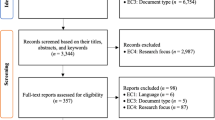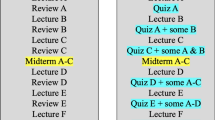Abstract
For the last few years, the author has been part of a team developing a mathematics course for students most of whom are women, many of whom are black and all of whom are attempting to gain entry to a teacher-training course by successfully completing a one year re-entry course. It is a requirement that teacher-training students should have attained a suitable standard in mathematics. Further Education colleges where re-entry courses are sited have a sad history of student failure in mathematics. The theoretical environment in which the development of this course took place is described in order to place the course in context. In particular, attention is drawn to the re-definition of mathematics which encourages student enquiry and experimentation in order to establish a basis for understanding the subject, and to the teaching/learning model which creates an environment of respect and confidence. The roles of students and staff in a learning environment of this kind are discussed. Particular attention is paid to the attitudes and feelings of the students and the effects on their expectations.
Similar content being viewed by others
References
Brown, S. I. and M. I. Walter: 1983, The Art of Problem Posing, Franklin Institute Press.
Buerk D.: 1982, ‘An experience with some able women who avoid mathematics’, For the Learning of Mathematics 3(2), 19–24.
Burton, L.: 1984, Thinking Things Through, Basil Blackwell.
Burton, L. and R. Townsend: 1985, ‘Girl-friendly mathematics’, Mathematics Teaching, 111.
Buxton, L.: 1981, Do You Panic about Mathematics?, Heinemann Education.
The Cockcroft Committee: 1982, Mathematics Counts, H.M.S.O.
French J. and P. French: 1984, ‘Gender imbalances in the primary classroom: An interactional account’, Educational Research 26, 2.
Gordon M.: 1978, ‘Conflict and liberation: Personal aspects of the mathematics experience’, Curriculum Inquiry 8, 3, John Wiley for the Ontario Institute for Studies in Education.
Graham, A. and A. Roberts: 1982, Sums for Mums (priv. pub.).
H.M.I.: 1985, Mathematics from 5–16, H.M.S.O.
Kelly, G. A.: 1970, ‘A brief introduction to personal construct theory’, in D. Bannister (ed.), Perspectives in Personal Construct Theory, Academic Press.
Mason, J., L. Burton, and K. Stacey: 1982, Thinking Mathematically, Addison Wesley.
Papert, S.: 1980, Mindstorms, Children, Computers and Powerful Ideas, Harvester.
Perry, G.: 1968, Forms of Intellectual and Ethical Development in the College Years, Holt, Rinehart and Winston.
Plunkett S.: 1981, ‘Fundamental questions for teachers’, For the Learning of Mathematics 2, 2.
Polyani, M.: 1974, Personal Knowledge, Chicago University Press.
Rowland, S.: 1984, The Enquiring Classroom, Falmer Press.
Spender, D.: 1982, Invisible Women: The Schooling Scandal, Writers and Readers Publishing Co-operative Society.
The Swann Committee: 1985, Education for All, H.M.S.O.
Thom, R.: 1973, ‘Modern mathematics: Does it exist?’, in A. G. Howson, Developments in Mathematics Education, Cambridge University Press.
Author information
Authors and Affiliations
Rights and permissions
About this article
Cite this article
Burton, L. From failure to success: Changing the experience of adult learners of mathematics. Educ Stud Math 18, 305–316 (1987). https://doi.org/10.1007/BF00386200
Issue Date:
DOI: https://doi.org/10.1007/BF00386200




